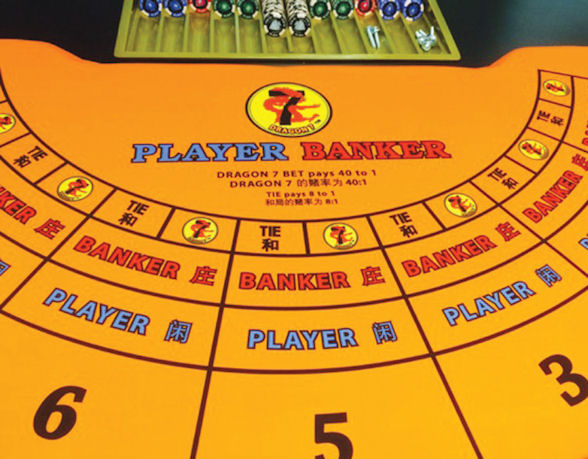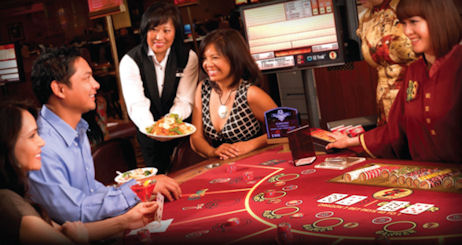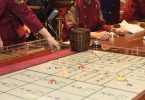This article first appeared in the Mar/Apr 2016 issue of WGM.
Imagine a scenario in which you managed to take one of the world’s most popular casino table games and tweak it in a way that not only provides tangible advantages to the house but simultaneously benefits the players as well. The two objectives seem diametrically opposed, yet that’s exactly what Robin Powell and TJ Tejeda set out to achieve after recognizing some basic flaws with standard baccarat. The result is EZ Baccarat – better known as Dragon 7 across Asia – which offers players a smaller house edge than its predecessors while upping the speed to allow more hands per hour. And having spread like wildfire through North America, Dragon 7 now has Macau’s gaming floors in its sights.

“If you are a player coming to Macau for the weekend, why would you play a game that high rollers in Macau refuse to play?” poses global gaming veteran TJ Tejeda.
“There are some players who will notice this and think, ‘That’s true, I’ve never seen it played in high limits … I wonder why?’ Well, I’ll tell you why – they won’t play it!
“The high rollers are probably from Hong Kong or Shanghai, they’re sophisticated, they’ve been all over the world and they know that game is not good for them!”
The game Tejeda is talking about might surprise you because right now it is among the most commonly played games on all of Macau’s mass gaming floors – no-commission baccarat.
Originally designed to eliminate the clunky and somewhat confusing process of taking five percent “commission” from all winning Banker bets in standard baccarat, no-commission baccarat has the advantage of allowing more hands per hour and reducing dealer mistakes.
This is due to an adjustment in how commission is charged with the five percent that is usually charged on all winning Banker bets simplified to a single 50 percent commission charged only if Banker wins with a total of 6.
But it’s not as simple as it could be and comes with the considerable drawback of a higher house edge – which is why Tejeda and his colleague Robin Powell created Dragon 7.
![[b]Dragon 7 creators TJ Tejeda (left) and Robin Powell[/b]](http://www.wgm8.com/wp-content/uploads/2016/02/images_wgm_1040_free-and-ez-2.jpg)
“If no-commission baccarat represents an evolution of the standard game, Dragon 7 takes that evolution one step further,” Tejeda explains. “I first saw no-commission many years ago in South America and I thought at the time, ‘Well this is a good start but there must be a solution that takes you all the way to no-commission altogether – where the dealer doesn’t have to touch a winning bet at all.”
Known as EZ Baccarat in the USA and Canada, Dragon 7 manages to do away with commission completely with all Banker wins paid in full except when Banker makes a three card total of 7, which becomes a push. In other words, at no stage does the dealer ever touch a winning bet.
It sounds simple enough, but the impact of this one change is huge. For starters, it basically eliminates the chance for dealer error – dealers either pay out at even money or pay nothing at all. It also creates a faster game with dealers no longer having to calculate any sort of commission.
But best of all, Dragon 7 actually benefits players by providing the lowest house edge of any baccarat variant at a tiny 1.02 percent on Banker bets. That compares to 1.06 percent in standard baccarat and 1.46 percent in no-commission baccarat – no wonder high rollers steer clear of the latter!
Putting this into practice, the Banker will only win with a three card total of 7 once every 43 hands or so (around twice per shoe), while the Banker win with 6 used in no-commission baccarat will occur on average around five times per shoe – although as TJ points out it is not unheard of to see it come up as many as 10 times in a shoe!
“So 10 times the dealer is going to grab your winning bet and break it in half,” Tejeda says. “It’s very clunky, it’s cumbersome. It seems to be a halfway project. We took it all the way so it’s only the one instance you don’t get paid and when that happens we just push the bet.
![[b]Studio City has installed eight Dragon 7 tables on its main gaming floor[/b]](http://www.wgm8.com/wp-content/uploads/2016/02/images_wgm_1040_free-and-ez-3.jpg)
“It happens twice a shoe so it’s like a flu shot once a year and it’s gone. It’s quick, it’s easy and you don’t have to worry about the dealer breaking and paying incorrectly because everything is paid out 100 percent.
“Dragon 7 is the end result of baccarat’s evolution.”
The obvious question is why any casino operator would be attracted to a game that offers such a small house edge? It all comes down to speed. A quicker game means more hands per hour and therefore more money being wagered at each Dragon 7 table.
More than that though, Dragon 7 could in-fact be the solution operators have been looking for when it comes to Macau’s controversial table cap, which has seen the new resorts opened by Galaxy and Melco-Crown in 2015 granted far fewer new-to-market tables than they had hoped.
Melco’s glitzy Studio City is the first of Cotai’s new properties to test the waters. Having been allocated 250 of the 400 new tables it had requested prior to opening last October, Studio City has installed eight Dragon 7 tables to operate alongside the no-commission tables that dominate their main gaming floor.
“And that’s how you make your money – by being faster, not by making the edge bigger,” Tejeda explains. “People play more hands per hour and they play for longer. We’ll see how it goes.”
They key isn’t so much breaking into the market however, it’s getting the message out to Macau’s players that there is now a better option available to them than they’ve had in the past.
“We are approaching this with lots of respect,” Tejeda continues. “We just want to start a dialogue where the customer goes ‘Hmmm, here is this new thing – maybe I should give it a try!’
“This is about the customers, not the casinos – because all we want to do is show them. We want them to compare Dragon 7 to no commission baccarat – to give it a try. And if they do that they will quickly find that not only is Dragon 7 better for them, it’s more fun!”

As confident as Tejeda may be in what Dragon 7 can offer the already well-established Macau market, he does have very good reason to believe. In fact, he has found himself the small fish in a giant ocean before.
Alongside co-creator Powell, the pair first developed the mathematical model for the game in 1998 after recognizing the common frustrations experienced by baccarat players and dealers alike.
But convincing the stubborn US establishment to try something new proved easier said than done.
“We didn’t sell a single game for 10 years,” recalls Tejeda, who had previously worked as Director of Baccarat at MGM Las Vegas. “The operators were like the Praetorian Guard – anything other than what they knew was to be shot and killed on sight!
“But then someone in California picked up two tables, then four.
“Today we have 95 percent of all the games in Los Angeles and San Diego. This is the golden coast of the United States and the strongest Chinese-American community in North America – and all they play is EZ Baccarat.
“It’s the same in Vancouver where 60 percent of the tables are EZ Baccarat. In four years we picked up half the market.”
Although the first Dragon 7 tables in Macau were actually launched at Wynn in 2009 (currently Wynn and MGM each have 10 tables of Dragon 7 in play), the game’s explosive growth through North America around the same time temporarily pulled the company’s focus away from Asia.

Yet the timing of this renewed Macau push could prove perfect. Not only are another five resorts – Wynn Cotai, MGM Cotai, The Parisian, Louis XIII and Lisboa Palace – due to open their doors inside the next two years, they will do so as part of a vastly changed gaming landscape in which the mass market customer can no longer be considered an afterthought.
“The great thing now is that these people (mass market players) are becoming important,” Tejeda enthuses. “The market is moving to the everyday customer.
“These people work hard for their money and I think we need to give them a better experience. That’s what this game does.
“It’s much easier for the players because they don’t have to watch the dealer break down their winning bet and at the end of the day it’s just more fun. It’s fast, there’s no waiting. As players you’ve already taken your money and moved onto the next hand. This is what Dragon 7 has. It has practical advantages for everyone.”







